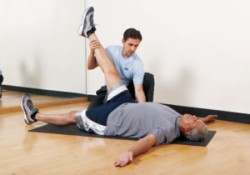When there is decreased strength in one or more of the muscles, it is  called weakness. It is a condition of when one feels frail and fragile, lacking of physical strength and energy. There are multiple causes for weakness, making it a common indicator for many health problems ranging from neuromuscular diseases to injuries to poison, among others. Weakness is often felt after doing an activity for an extended period of time causing the muscles to be sore.
called weakness. It is a condition of when one feels frail and fragile, lacking of physical strength and energy. There are multiple causes for weakness, making it a common indicator for many health problems ranging from neuromuscular diseases to injuries to poison, among others. Weakness is often felt after doing an activity for an extended period of time causing the muscles to be sore.
Weakness and fatigue are frequently interchanged; however, they are different from one another. Whereas weakness is due to lack of muscular strength, fatigue is a feeling of lack of energy. Weakness and fatigue are not diseases on their own and are usually brought about by an underlying cause.
Types of Weakness
There is a difference between true weakness and perceived weakness which differs based on how the function of muscles is impaired. The two will be further discussed below.
- True weakness (neuromuscular)
- Objective
- Impairment of muscle functioning
- Simple activities cannot be done such as lifting and gripping
- Perceived weakness (non-neuromuscular)
- Subjective
- Actual muscle strength is retained but feels that one is exerting more effort to give force
- Feeling tired after walking up the stairs
Cause of Weakness
Weakness is a result of a wide range of conditions. Some of these include:
- Muscle diseases
- Muscular dystrophy
- Dermatomyositis
- Becker muscular dystrophy
- Brain/ nervous system
- Post stroke
- Bell’s palsy
- Cerebral palsy
- Multiple sclerosis
- Pinched nerve
- Metabolic
- Insufficient sodium or potassium in the body
- Addison’s disease
- Hyperparathyroidism
- Poisoning
- From gases and insecticides
- Others
- Asthma
- Anemia
- Cancer
Treatment of Weakness
Weakness is usually not a medical emergency and can be treated at home. Home treatment will usually improve weakness.However, if the weakness is abrupt and accompanied by a fever, it may be better to contact a medical professional. The following tips are not be used as substitute for medical advice or first aid training. These are mere tips to help relieve weakness felt.
- Allow the body to get extra rest.
- Get enough sleep every night.
- Eat a nutritious diet. Do not skip meals, especially breakfast.
- Frequently drink clear fluids even in between meals to prevent dehydration. Avoid alcohol and caffeine.
- Exercise regularly to avoid fatigue.
It is important to know and understand weakness as it can narrow down the many possible causes of symptoms one is experiencing. It is important to recognize weakness when it occurs to have it diagnosed in case there is an underlying disease that is causing the said symptom. Various organizations and institutions, such as St Mark James, offer Standard First Aid courses that teach first aiders how to recognize symptoms and emergency scenarios, even common symptoms such as weakness.
